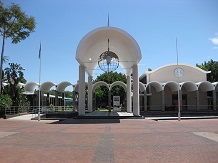articles

Parliament of Botswana, Gaborone.
Doctoral student, Jonathan Kamkhaji, has worked on a WB assignment in Botswana concerning regulatory reform and business climate.
A fundamental aim of the Centre for European Governance is to engage with policy reform agendas in government and international organisations and to produce ‘usable knowledge’. In this context the Centre has developed links with the World Bank over the years and produced scientific papers for their regulatory reform programmes – as evidenced by our REF-2014 submission. This academic year one of our doctoral students, Jonathan Kamkhaji, has worked on a WB assignment in Botswana concerning regulatory reform and business climate.
Why our Centre and why this particular student? First, Jonathan has a background in both economics and political science, having studied for a PhD in economics in Turku before moving to Exeter. At the Centre for European Governance, Jonathan worked as research fellow in an Advanced Grant of the European Research Council on regulatory governance and learning, developing methodological skills in coding, analysing, appraising regulatory impact assessments – as well as communicating research findings to different audiences.
Whilst the WB is not short of consultants, consultancy firms typically propose a standard repertoire of solutions to the problem of the client. In this case however the problem was one of triggering a process of reform rather than ‘selling a tool’. Jonathan – with a senior officer from the WB – engaged the stakeholders of regulatory reform in a process of learning involving dialogue, capacity building, and co-creation of know-how. Upon completion of this assignment, the government of Botswana has endorsed the wider follow-up strategy suggested by the team.
